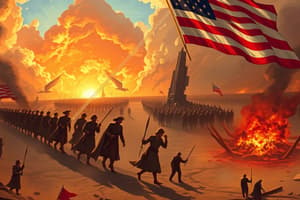Podcast
Questions and Answers
What were the reasons behind the United States' 'new imperialism'? (Select all that apply)
What were the reasons behind the United States' 'new imperialism'? (Select all that apply)
- Competition with other nations (correct)
- Extension of manifest destiny (correct)
- Desire for isolationism
- Need for worldwide markets for industrial goods (correct)
Define imperialism.
Define imperialism.
Acquiring territory or gaining control over the political systems or economies of other countries.
Who were the Presidents involved in US imperialism?
Who were the Presidents involved in US imperialism?
McKinley, Theodore Roosevelt, William Howard Taft, Woodrow Wilson.
Who were the major advocates of US imperialism?
Who were the major advocates of US imperialism?
Who achieved the following: authored 'The Influence of Sea Power Upon History' and advocated for a strong navy?
Who achieved the following: authored 'The Influence of Sea Power Upon History' and advocated for a strong navy?
Define mass media.
Define mass media.
What type of expansion took place in the US as a result of Lincoln's Secretary of State James Seward?
What type of expansion took place in the US as a result of Lincoln's Secretary of State James Seward?
How did the US get involved in Cuba?
How did the US get involved in Cuba?
How did the US get involved in the Spanish-American War?
How did the US get involved in the Spanish-American War?
What is 'Yellow Press' or 'Yellow Journalism'?
What is 'Yellow Press' or 'Yellow Journalism'?
What was the De Lome Letter?
What was the De Lome Letter?
What four reasons did President McKinley give in favor of war with Spain?
What four reasons did President McKinley give in favor of war with Spain?
What was the Teller Amendment?
What was the Teller Amendment?
How was the Spanish-American War fought?
How was the Spanish-American War fought?
What happened during the capture of Manila?
What happened during the capture of Manila?
Flashcards are hidden until you start studying
Study Notes
Reasons for US New Imperialism
- Demand for global markets for industrial and agricultural products.
- Need for new sources of raw materials to support growth.
- Viewed as a resolution for domestic discontent, offering a "safety valve" for US citizens.
- Extension of Manifest Destiny ideology beyond US borders.
- Rise of jingoism, promoting aggressive foreign policies based on nationalism.
- Competition with European powers like Britain, France, Germany, and Russia.
Definition of Imperialism
- Acquiring territory or gaining control over other countries' political systems and economies.
Presidents Involved in Imperialism
- Key figures include McKinley, Theodore Roosevelt, William Howard Taft, and Woodrow Wilson.
Major Advocates of US Imperialism
- Missionaries, such as Josiah Strong, promoted a sense of duty to spread Christianity and Western civilization, reflecting the "white man's burden."
- Politicians, particularly pro-business Republicans, aimed to expand markets and secure raw material sources.
Alfred T. Mahan
- US Naval Captain who authored "The Influence of Sea Power Upon History" in 1890.
- Advocated for a strong navy, modern steel-hulled ships, naval bases in strategic locations, and the construction of a Panama Canal.
- By 1900, the US possessed the world's third-largest navy.
Definition of Mass Media
- Newspapers and magazines used sensational stories about exotic locations to increase circulation.
Expansion During Seward's Tenure
- James Seward, Lincoln's Secretary of State, orchestrated the 1865 purchase of Alaska from Russia for $7.2 million.
- Initially called "Seward's Folly" or "Seward's Icebox" due to early unpopularity.
US Involvement in Cuba
- Cuba was a Spanish colony with historical US interest dating back to the Jefferson era.
- Significant American investments in the Cuban sugar industry during the 1890s fueled interest in annexation.
Spanish-American War Catalyst
- Cuban nationals revolted against Spanish rule, prompting Spain to deploy 100,000 troops to suppress the rebellion by 1895.
Yellow Press and Yellow Journalism
- Sensational journalism aimed at increasing newspaper sales through exaggerated stories.
- Joseph Pulitzer's NY World and William Randolph Hearst's NY Journal fueled public outcry with dramatized accounts of Spanish atrocities.
The De Lome Letter
- An intercepted letter from a Spanish diplomat ridiculed President McKinley, inflaming public sentiment against Spain.
- The February 15, 1898 explosion of the USS Maine in Havana, killing 260, was attributed to Spain by the yellow press.
McKinley's Reasons for War with Spain
- Aimed to halt suffering in Cuba and protect American lives and property.
- Also focused on safeguarding US commerce and addressing threats to national peace.
The Teller Amendment
- Passed on April 20, 1898, it assured that the US would not assume control over Cuba and intended to return it to its people post-war.
Conduct of the Spanish-American War
- Known as "a splendid little war," it featured rapid military engagement initiated by the US declaring war in April 1898.
The Philippines and Manila Capture
- Formerly a Spanish colony, the Philippines saw US intervention orchestrated by Theodore Roosevelt before war declaration.
- On May 1, 1898, US forces attacked the Spanish fleet in Manila Bay, leading to a quick victory and capture of Manila on August 13, aided by Filipino rebels led by Emilio Aguinaldo.
Studying That Suits You
Use AI to generate personalized quizzes and flashcards to suit your learning preferences.




